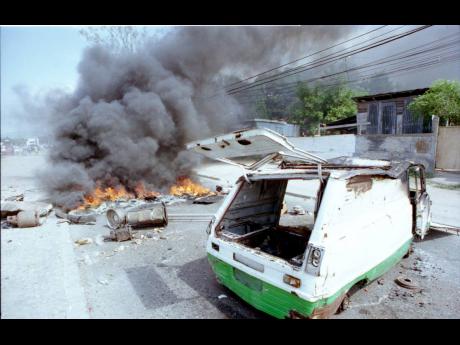Trevor Munroe | Enforce the law! Maintain social peace; render social protest unnecessary
Last Sunday, June 9, a little over 300 miles away in Haiti, tens of thousands of Haitians took to the streets in the capital and elsewhere protesting against corruption in government. Demonstrators came from a wide cross section of society, including political parties, religious groups, and community organisations.
Protestors were demanding investigation and action in relation to embezzled funds generated from subsidised oil shipments from Venezuela under the Venezuelan PetroCaribe programme as well as the removal of President Jovenel Moïse for the mishandling of corruption allegations. Protests turned violent as anti-corruption demonstrators burnt tyres and blocked roads, with two deaths occurring.
Thankfully, in Jamaica, there are no such violent protests arising from growing concerns, much less demonstrations against corruption. No one, however, who wants progress and prosperity for our people should take Jamaica’s surface calm for granted or as a sign that Jamaicans shall indefinitely put up with the politically connected and the powerful remaining free despite credible allegations of corruption:
- At Petrojam, for over 10 years there have been hundreds of millions of dollars lost, reported on in successive auditor general’s reports.
- At the Manchester Municipal Corporation, an over $400 million fraud probe is under way.
- And now a probe has been launched into operations at the Caribbean Maritime University
The public purse, we are told, cannot provide more money to feed our school children or to support critical institutions like the National Parenting Commission, while the corrupt in high places dip their hands into the public purse to take out millions of dollars, putting on lavish parties on yachts, birthday celebrations in resorts for friends and company – all with tax-payers’ money.
Those who have eyes to see and ears to hear should note well the growing discontent with corruption: in the letters to the newspapers, in social media posts, in editorials, in the growing anger in the voices calling into the talk shows. Fear of victimisation, hopes of migrating, and ingenious forms of hustling can and will keep our people quiet for a time, but not indefinitely. Ultimately, we take a stand against injustice.
I well remember April 1999. A 31 per cent increase in gas price was announced by the then People’s National Party (PNP) Government. The Jamaica Labour Party (JLP) Opposition, religious groups, and civil society rejected the increase. Three days of civil unrest and street protests followed.
The consequence: nine deaths, 152 arrests, 14 policemen injured, 16 police vehicles damaged; public transport, schools, businesses, and banks closed.
I was then serving as an independent senator in Jamaica’s Parliament, and I remember the telephone call from Prime Minister Patterson asking me to serve as deputy chairman on a broad-based committee, chaired by then Private Sector Organisation of Jamaica (PSOJ) president Peter Moses, to propose alternatives to the gas hike. We did. The price hike was rolled back within a week, and the country returned to calm.
SOLUTIONS
No one wants to see a return to civil unrest and the mayhem of Haiti 2019 or Jamaica 1999. So what is to be done?
- The Public Administration and Appropriations Committee (PAAC) and the Public Accounts Committee (PAC), through both government and opposition members, must remain relentless in exposing wrong wherever it is to be found.
- The people and civic bodies, like the PSOJ, National Integrity Action (NIA), and the churches must sustain demand not only for resignations, but speedy investigation, effective prosecution, speedy trials, and appropriate jail time for the corrupt found guilty.
- We must press for answers to critical questions and not have them lapse/ For example, the public was informed by the Integrity Commission one month ago that our prime minister’s statutory declaration had not been ‘cleared’ and, subsequently, that our prime minister provided ‘further information’ to the Integrity Commission. But why has the Commission not indicated that our prime minister’s statutory declaration is now ‘complete’ in accordance with the law? Why was Minister Ruel Reid’s resignation demanded?
How well are investigations progressing after the raid by the Major Organised Crime & Anti-Corruption Agency (MOCA) and Integrity Commission officials on Petrojam one year ago?
- Most of all, with our support and encouragement, the public officials of integrity at the Financial Investigations Division (FID), MOCA, the Integrity Commission, the Office Of The Director Of Public Prosecutions (ODPP), and the courts must remain resolute, show neither fear nor favour in upholding the law, especially in relation to those whose connections and influence make them hitherto “untouchable”.
Law enforcement officials of integrity should not betray either their responsibility or the people’s trust in those institutions, a trust that is well above the peoples’ confidence in the politicians and in political parties.
The 2017 Latin American Public Opinion Project Survey shows the public’s satisfaction level with MOCA at over 71 per cent, with the Independent Commission of Investigations (INDECOM), the Auditor General’s Department, the ODPP, and the Office of the Contractor General all at over 60 per cent.
The people’s expectation must not be disappointed. By doing the right thing, enforcing the law, and holding the powerful to account, history shall record that our law-enforcement and anti-corruption institutions played a critical role in maintaining relative social peace and in rendering social protest unnecessary.
- Professor Trevor Munroe, CD, DPhil (Oxon), is the executive director of National Integrity Action (NIA). Email feedback to tmunroe@niajamaica.org and columns@gleanerjm.com.


